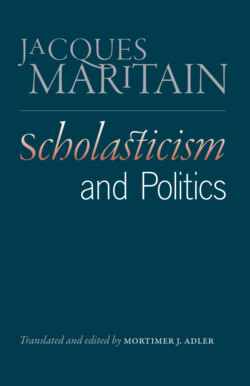Читать книгу Scholasticism and Politics - Jacques Maritain - Страница 10
На сайте Литреса книга снята с продажи.
CHAPTER II SCIENCE AND PHILOSOPHY I STATE OF THE QUESTION
ОглавлениеI shall use the two words ‘science’ and ‘philosophy’ in the sense which they have acquired in modern times, according to which science designates above all the mathematical, physico-mathematical and natural sciences, or, as one is also wont to say, the positive sciences, the sciences of the phenomena; philosophy designating above all metaphysics and the philosophy of nature.
Truly speaking, the problems of science and philosophy have been renewed and have become extraordinarily complicated in our time. First, the crisis in the growth of modern physics, while launching science itself on an entirely new path, has liberated it from many pseudo-dogmatisms and much pseudo-metaphysics, and especially from the materialism of the physicists ‘of the Victorian age’, as Eddington says, with their pretence to ‘explain’, some day, the essence of bodies, according to mechanistic determinism, and even to account for the occurrence of every single event in the universe. This crisis has made physics more conscious of its own nature.
Secondly, and at the same time, a considerable work has also been accomplished by the theoreticians of science, by logicians and by logisticians. Finally, this crisis of growth has not only diminished the dogmatic pretensions of experimental science, it has also deeply transformed in this domain (and by contagion, in certain other spheres) the work and the methods of reason; it has taught reason a sort of exhilarating freedom, a new and terrible freedom, to repeat the words used by Dostoievsky in quite a different matter. Yes, and as it were in compensation, a tendency towards systematic interpretation, imposing very rigorous rules and seeking a sort of logical purism, has been developed by certain theoreticians. I have in mind the logicians of the Viennese School, on whose ideas I should like to dwell in the first part of this chapter.
It must not be forgotten, however, that all great movements of contemporary thought react, in the most varied way, on our notion of science. On the one hand, German phenomenology, Bergson, Whitehead, pragmatism, thomism,—each offer their general conception of the life of knowledge, and their views on the nature of knowing. On the other hand, influences of a more practical order further complicate the work of the mind; in particular, the conceptions inspired by dialectical materialism,—which are the climax of modern revolutionary rationalism,—exert, as from the outside, a considerable influence on certain parts of scientific thought, and cannot therefore be ignored.
By attempting to characterize the ideas of the Viennese School on the philosophy of science, I hope to present the conceptions of science and philosophy which I believe true. I will also take the opportunity to define briefly the Thomist position in regard to Marxist epistemology. The word ‘Marxist’ has a political resonance, rendering its use somewhat irrelevant in a discussion of speculative philosophy. However, the thought of Marx, though turned toward the practical domain, includes a philosophy, whose internal power and historical importance are considerable. And we should deal with it only from this point of view.
In Professor Tawney’s judgment, Marx is the last of the Schoolmen in his economic doctrine. What is definitely so serious in the occurrence of Marxism is that it offers us the case of a philosopher precipitating philosophy (Hegelian philosophy) into practical activity, social and political, considered as its very essence, its very life and its genuine justification. At the beginning was action, wrote Goethe. We have now the full substitution in thought itself of the Word by Action. Such a substitution leads a long way, and reaches results unsuspected by Marx himself. When a State claims the political right to impose a certain Weltanschauung, a certain philosophy, on all populations of the same race and blood, this pretension, to the infinite dishonour of philosophy, is the final embodiment of the concessions, which in the end—at the extreme point of Hegelianism—philosophy has had to yield to praxis, to the mailed fist which was at the beginning.
